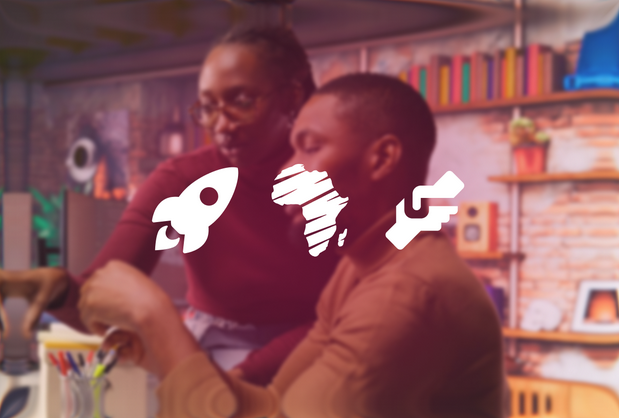Insights
Articles
17 September 2025
9 min read
How African Startups Can Scale Faster With the Right Software Partners
Praise Ohans
Author

Introduction
Scaling a startup in Africa is beyond raising enough capital or scribbling clever ideas on a whiteboard. Don’t get me wrong, money and vision help, but they are never enough, at least to me. Africa’s market is alive with opportunities, albeit fragmented and unforgiving. Regulations shift from city to city, infrastructure gaps slow down even the most brilliant products, and consumer needs change faster than founders can update their pitch decks. You think survival is hard? Trust me, scaling is even harder.
This is where the right software partners step in. They don’t just deliver code or tools; they offer infrastructure that grows as you grow. They provide expertise that keeps your systems from collapsing under pressure. And perhaps most importantly, they carry networks that open doors a young company could not unlock on its own. For a founder in Nairobi, that might mean guidance on mobile money compliance. For a team in Lagos, it could mean cloud services that deploy in days instead of months. For a startup in Accra, it could mean connections to investors and payment providers that extend reach far beyond West Africa. When you plug into the right ecosystem, you’re iterating faster, scaling sustainably, and positioning yourself for markets you never thought you could enter.
Startups that align with the right partners gain a competitive edge. They scale faster. They avoid costly mistakes. They unlock new markets that once felt out of reach. In 2025 and beyond, those alliances will separate the startups that merely survive from the ones that define Africa’s next growth story.
The Role of Strategic Software Partners
When people hear the phrase, "software partner”, they more often than not think of it as outsourced developers; someone who builds you an app or tweaks your backend. The right ones go beyond coding, they bring technical mentorship, strategic guidance, and market entry support that amplify what a startup can do on its own.
Let us consider the global players like Microsoft and Google, for instance, their startup programs go beyond discounted cloud credits; they mentor founders, provide co-marketing opportunities, and share technical roadmaps that help products scale without crumbling under demand. At the regional level, telecom giants like MTN and Orange often double as distribution partners. Their massive customer bases give startups immediate market exposure. Then there are specialized software firms and accelerators that operate almost like co-founders, embedding themselves into a startup’s journey by offering tailored tools, iterative testing support, and go-to-market strategies.
The outcome of these partnerships is tangible. Startups enjoy smoother infrastructure that doesn’t buckle under growth spikes, faster product iteration cycles fueled by external expertise, and enhanced reach into markets that would have taken years to access independently. In short, strategic software partners help African startups do what they already dream of, only quicker, and with far less risk of burning through limited resources.
Corporate Partnerships Fueling Startup Growth
Corporate partnerships have become one of the most reliable ways for African startups to accelerate scaling. These alliances deliver the technical backbone, customer trust, and market access that young companies need to grow. Take cloud infrastructure for example, Microsoft partners with African startups in sectors like fintech, healthtech, and agtech. Through initiatives like its Startups program and 4Afrika, the company equips early-stage ventures with cloud services, mentorship, and market entry support, while its hubs in Lagos, Nairobi, and Cape Town anchor its commitment to Africa’s innovation economy.
In Francophone Africa, Orange plays a similar role. Its Orange Fab accelerator and investment arms give startups access to telecom infrastructure, mentorship, and integration opportunities, enabling them to scale faster by plugging directly into Orange’s vast networks.
On the fintech side, partnerships like Flutterwave’s collaborations with Visa and Mastercard have been game changers, boosting trust, enabling seamless payments, and expanding reach across borders. Likewise, Vodafone and Standard Bank continue to support regional expansion and pilot programs, giving startups credibility and real-world validation.
Together, these partnerships aside from providing capital help startups prove reliability, attract investor confidence, and enter new markets with clarity.
Leveraging Offshore Software Development
For African startups, scaling quickly is a matter of execution speed. Having a solid product idea is wonderful, but you still need to get it built, tested, and shipped fast enough to stay ahead of competitors. This is where offshore software development comes into play.
Many startups on the continent partner with Indian development firms, not just because of lower costs but because these teams bring a mix of agile practices, global experience, and modern tech stacks. Be it AI-powered analytics, blockchain for secure transactions, or cloud-native apps, Indian developers are well-versed in the technologies African startups need to compete globally.
Not to forget that there’s also the benefit of time zones. A startup in Lagos or Nairobi can hand off tasks at the end of the day to a team in Bangalore and wake up to see considerable progress delivered overnight. This kind of round-the-clock development cycle drastically shortens time-to-market, allowing startups to roll out updates, respond to customer needs, and test new features at a fast pace.
Innovation through Testing as a Service (TaaS)
Having a brilliant software idea is not enough, and can very much collapse under real-world conditions. For resource-strapped African startups, building a full in-house quality assurance team isn’t always realistic. That’s where Testing as a Service (TaaS) changes the game.
By outsourcing testing, startups can validate their apps under real usage scenarios: stress testing payment systems, checking mobile compatibility, or simulating peak user traffic, without the burden of upfront investment. This means issues are detected early, before they spiral into expensive fixes or damage user trust.
TaaS also enables startups to deliver reliability even on a tight budget. Products get to market quicker, customer satisfaction remains high, and the startup avoids the rework cycles that can drain both time and investor confidence. For early-stage startups especially, this model is a way to punch above their weight, launching products that meet global standards without carrying global costs.
Building Trust with Partnerships and Compliance
For startups, be it local or foreign, even after building the right product, scaling is almost impossible without building trust. Clients and investors all want reassurance that a company is credible, compliant, and capable of operating across borders. Strategic partnerships are often the fastest way to achieve that.
Take Paystack for example. Its close relationship with local banks helped it establish early credibility in Nigeria’s financial sector. When Stripe acquired Paystack, that endorsement alone sent a clear message that it wasn’t just a buyout, it was a vote of confidence that Paystack was not just another payments company, but it was one that had the regulatory and operational rigor to scale globally. Investors and users alike took notice.
Similarly, Flutterwave built credibility by aligning with global payment giants like Visa and Mastercard, leaving users with the feeling that they could transact with confidence. Its partnership with Uber further validated its reliability, proving that a global corporation was willing to bet its operation in Africa on Flutterwave’s infrastructure. These alliances, asides boosting Flutterwave’s geographical reach also helped build an indelible feeling of legitimacy that no amount of advertising could.
For startups navigating Africa’s regulatory environments, compliance partnerships can make the difference between staying local and going continental. Trust has, and will always remain a sure ticket to scale.
Comprehensive Support Ecosystems
Beyond one-to-one partnerships, many African startups benefit from being part of holistic support ecosystems that provide a structured foundation for growth. These ecosystems don’t just stop at offering funding or technical help, they also blend together mentorship, compliance guidance, infrastructure, and market access, tackling the impediments that often slow down early-stage ventures.
One notable example is Digital Africa’s “Platform”, which equips startups with resources ranging from technical mentorship to legal and regulatory support. By addressing the structural gaps that individual partnerships can’t always cover, these ecosystems prepare startups to launch, while sustaining and scaling in highly competitive markets.
These ecosystems also offer an invaluable level of integration. Startups get connected to investors, regulators, and technical experts in a single, coordinated pipeline. Instead of amassing support one partner at a time, they gain access to a network that accelerates every aspect of their journey.
For founders looking to balance product development with fundraising, compliance, and expansion, these ecosystems function as a growth multiplier, making scaling faster and more resilient.
Conclusion
Scaling a startup in Africa is no easy feat. The markets are vibrant but fragmented, the infrastructure is improving but uneven, and regulatory environments shift from country to country. Yet, the startups that rise above these challenges tend to have one thing in common: the right software partners in Africa.
From cloud infrastructure with Microsoft, to fintech partnerships with Visa and Mastercard, to strategic backing from Orange, Vodafone, and Standard Bank, these alliances give startups more than resources. They provide trust, speed, and market access. Offshore software development in India keeps products iterating around the clock, while Testing-as-a-Service (TaaS) ensures they are launch-ready. Compliance partnerships strengthen investor confidence, and ecosystem platforms in Africa like Digital Africa’s “Platform” wrap mentorship, funding, and legal support into a single scalable pipeline.
No startup scales alone. The right software development partners for African startups are accelerators. For African founders, aligning with them is the fastest way to achieve startup growth in Africa, break into new markets, and compete globally.
FAQs
1. What role do software partners play in scaling African startups?
Software partners in Africa provide more than development services. They deliver technical mentorship, infrastructure, compliance guidance, and market access, helping startups scale faster and more sustainably.
2. Why can’t African startups rely on funding alone?
Funding helps, but without trusted software partners in Africa for infrastructure, regulatory alignment, and customer trust, startups risk burning through capital before achieving real scalability.
3. How do offshore software development partners support African startups?
Offshore firms, especially in India, give African startups access to affordable engineering talent, modern tech stacks like AI, blockchain, and cloud, and 24/7 development cycles that reduce time-to-market.
4. Which partnerships are most critical for African fintech startups?
Fintech startups in Africa rely heavily on partnerships with banks, regulators, and global payment providers. These alliances build trust, ensure compliance, and enable secure cross-border transactions.
5. What’s an example of a comprehensive ecosystem supporting African startups?
A strong example is Digital Africa’s Platform, which combines mentorship, compliance assistance, funding, and technical support, creating a complete ecosystem for startup growth in Africa.
TAGS:
Build what matters, with Gozade
Let's Talk
Gozade
Address 1
3rd Floor, 86-90 Paul Street, London, England, United Kingdom, EC2A 4NE
Address 2
SUITE E141, IKOTA SHOPPING COMPLEX, VGC AJAH LAGOS, NIGERIA
+2349032770671, +44 7873272932
Gozade builds smart digital solutions that help businesses grow and scale with confidence.
© 2026 Gozade. All rights reserved.

